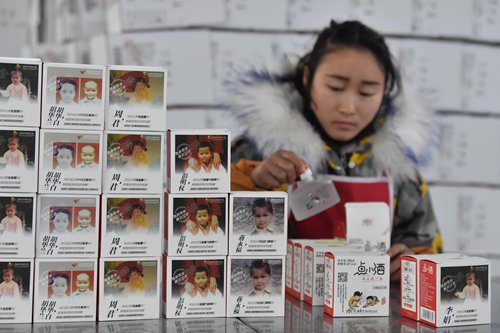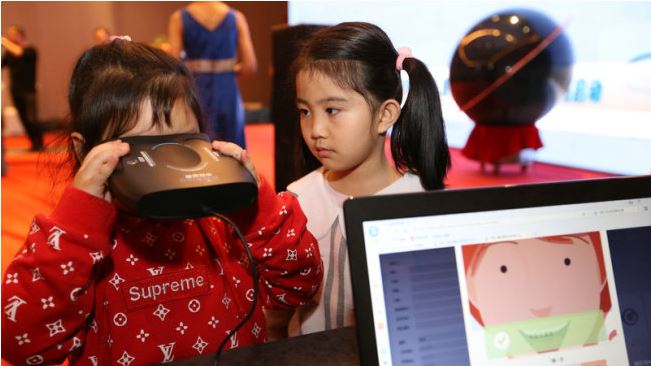
From the People's Daily app.
And this is Story in the Story.
Efforts continue in the fight against child trafficking in China with an initiative by one company to put information about missing kids on liquor bottles and takeout boxes.
A Chongqing alcohol company recently released more than 110,000 bottles of liquor containing information about lost children on the package in the hope of finding leads for their safe return to their families.
The move has won applause from most people while others suggested it was merely part of the company's marketing strategy to promote its products.
The promotion is part of the "Baby Back Home" program under China Charities Aid Foundation for Children (CCAFC), a national public-raising foundation under the administration of China's Ministry of Civil Affairs.
Today's story in the story looks at the methods being employed to crack down on child trafficking.

A worker from a factory in Southwest China's Chongqing Municipality wraps bottles of wine with information on missing children on Thursday. (Photo: IC)
Chongqing-based Laoyuanzi printed the photos and names of 1,000 lost children including information about their physical appearance such as a scar. The company's online store says it put the information on 114,949 bottles of its products, Dianxiaojiu.
A bottle of Dianxiaojiu sells for 20 yuan ($3) and the entire profit —8.7 yuan — will be donated to the CCAFC, said Ye Weiwei, who works for the foundation.
The precise number of bottles has a literal meaning in Chinese. The company has pledged to undertake "one" charitable project "once" a year through "four" seasons. Nine, in Chinese, is a homophone for long-lasting.
An employee from the company's online store said that many customers bought the special packaged wine just to support the charity project. More than 900 bottles have been sold since early December, said the employee.
While most people praised the company's action, some suspected it was just a performance to gain reputation and sell products.
The company's manager Xiao Dufeng said he was inspired by his friend who was deeply saddened after his child went missing. "If I only wanted to make money, I would not donate any profit to charities," Xiao said.
In the US, information about missing children has been printed on milk cartons since 1984 and now the information is pushed to cellphones through a system called Amber Alert.
Two people were sentenced to death over child trafficking in December by a local court in South China's Guangdong province.
The two defendants were also deprived of their political rights for life, and their properties will be confiscated, according to the Intermediate People's Court in the city of Guangzhou.
Another three child traffickers were given jail terms ranging from 10 years imprisonment to life imprisonment, the court said.
According to the court, the gang was found guilty of trafficking nine kids between 2003 and 2005.

A child from Harbin, Heilongjiang province records her iris information. (Photo: Xinhua)
In late 2017, an online platform using iris recognition technology was set up in Tianjin as a way of fighting child trafficking.
When recording their children's irises on the platform, parents can add their information and address. If any lost or abducted children are found, their identities can be verified quickly using the platform.
As the most convenient and advanced biological recognition technology, iris recognition has obvious advantages over fingerprints and facial recognition in terms of stability and accuracy. Its error rate is about one in 10 million, lower than DNA tests.
The Ministry of Public Security has verified that the quality and security of the online platform conforms to national standards.
Although no official data is currently available, more than 43,000 families have registered with Baby Back Home in search for their children while some 38,000 individuals are looking for their families through this program.
A missing persons alert system launched by the Ministry of Public Security in 2016 broadcast information about 2,767 missing children and managed to find nearly 2,700 of them, data from the ministry showed.
But many more are believed to be abducted each year and sold to underground adoption agencies.
China's criminal laws punish child traffickers with imprisonment of 5 to 10 years, but Baby Back Home founder Zhang Baoyan believes these penalties are not enough.
"Many traffickers are still at large, because the law states that a suspect will not be prosecuted when a case exceeds the period set forth by the statute of limitations. We've had many victims who identified traffickers after growing up, but the court could not accept the case because it happened 10 or 20 years ago."
(Produced by Nancy Yan Xu, Brian Lowe, Lance Crayon, and Chelle Wenqian Zeng. Music by: bensound.com. Text from Global Times, China Daily, China Plus, and CGTN.)


